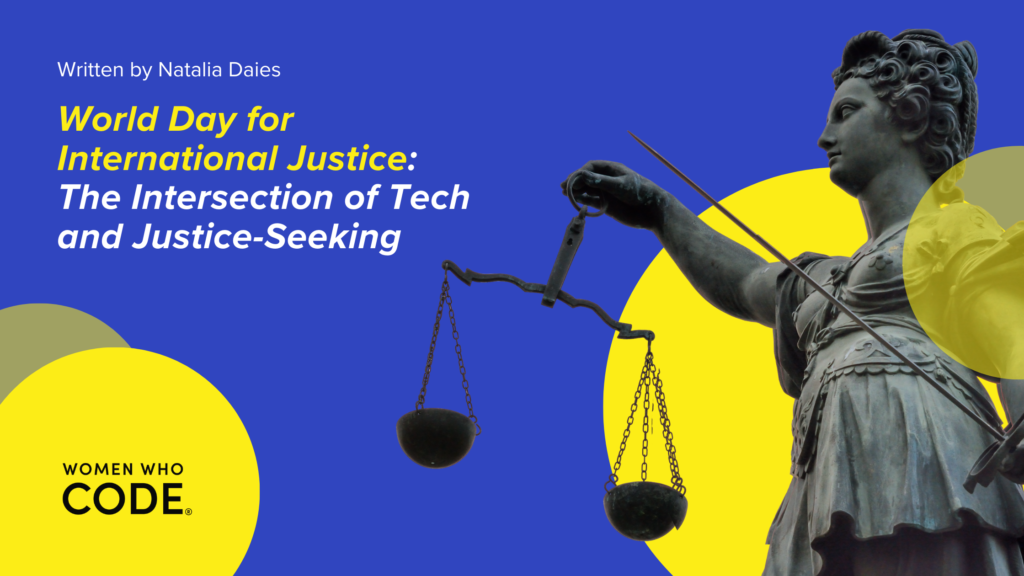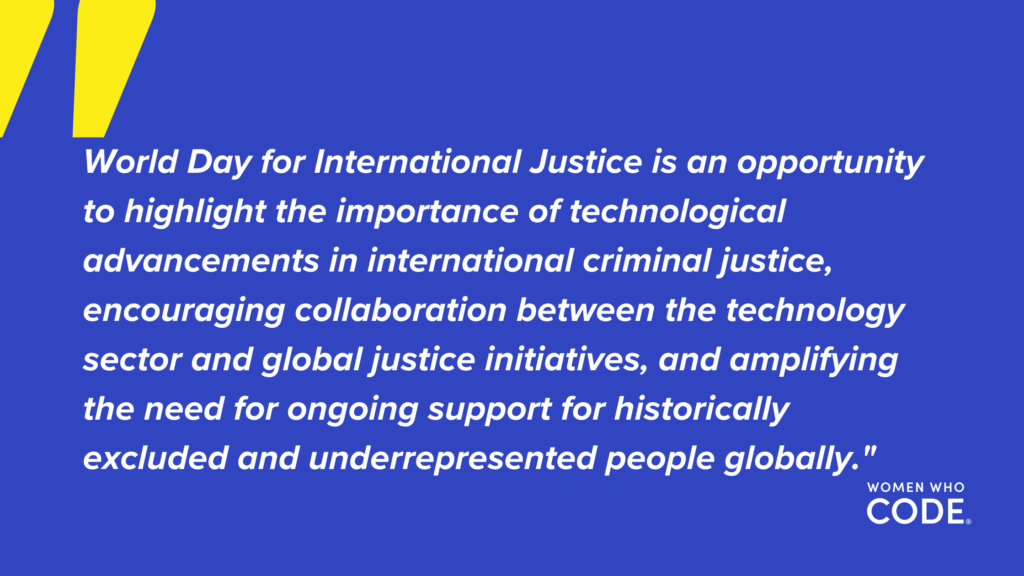World Day for International Justice: The Intersection of Tech and Justice-Seeking
Written by Natalia Daies

World Day for International Justice or International Justice Day (July 17th) recognizes international criminal justice and highlights the global commitment to justice for crimes against humanity. This day not only marks the establishment of the system of international criminal justice in 1998, the first independent international judicial institution focused on severe violations of international humanitarian and human rights but provides a platform for honoring victims and survivors of international crimes.
World Day for International Justice is significant for many reasons, including promoting awareness and education and advocating for justice and peace. The day reinforces the link between international justice and peacebuilding, breaking violent cycles, encouraging healing, and establishing a more just and peaceful world. While the direct connection between World Day for International Justice and technology may not be immediately apparent, there are several ways in which international justice efforts intersect with the technology industry:
- Technological advancements for social change: The field of international justice relies on technology for data analysis and improved information management. Technology, such as data analytics, machine learning, and cybersecurity, has significantly enhanced the effectiveness of justice-seeking initiatives. Data analytics, for example, is used by many organizations to support work toward racial and gender equity and environmental justice. Organizations like DataKind, are leading the way to empower technologists and companies to use data science and AI for social change to alleviate poverty and increase access to healthcare.
- Use of technology in digital peacebuilding: Technology has been instrumental in documenting and investigating international crimes. Examples include satellite imagery, social media analysis, combating online hate speech, and digital forensics. The technology industry is pivotal in developing and providing tools to promote peace and cooperation. PeaceTech Lab is using tech to offer training and tools to global peacebuilders to support the disruption of the spread of misinformation and hate speech and to anticipate social and economic unrest.
- Ethical considerations in technology development: World Day for International Justice raises awareness about the moral dimensions of technology development and accountability. As the technology industry continues to innovate, there is a growing recognition of the need to ensure that technologies are developed and used in ways that respect human rights and reduce harm. Some of the most important topics at the intersection of tech, ethics, and international justice are the misuse of personal information, bias and the use of AI, health tracking for women and non-binary people, and the impact of autonomous tech on jobs.
- Data protection and privacy: The technology industry contributes to safeguarding personal information and ensuring compliance with relevant laws and regulations. Amnesty International – Tech is an example of an organization advocating for keeping human rights at the forefront of technological advancement and the justice system. The movement is fighting against oppressive legislation, amplifying the ways discrimination and bias are embedded in tech and social algorithms, and advocating against the use of technology in censorship related to human rights campaigns.
- Social responsibility and corporate accountability: World Day for International Justice also reminds technology companies of their social responsibility and their products and services potential impact on human rights and justice. It encourages companies to assess and address potential risks or unintended consequences associated with their technologies and uphold accountability and transparency principles.

World Day for International Justice is an opportunity to highlight the importance of technological advancements in international criminal justice, encouraging collaboration between the technology sector and global justice initiatives, and amplifying the need for ongoing support for historically excluded and underrepresented people globally. Protection from apps abusing access, personal sexual and reproductive health information, climate change, and police brutality, tech organizations worldwide advocate for human rights and create a more efficient, sustainable, and equitable justice system and world.
This World Day for International Justice, learn more about tech and justice-seeking by following organizations using tech for social good. Here are a few to get started:
- Amnesty International – Tech advocates for the responsible use of technology to address serious human rights issues and protect vulnerable communities.
- DataKind is using data science to support mission-driven organizations.
- PeaceTech Lab is committed to reducing violent conflict by using tech and data to inform the work of technologists, policymakers, and activists.
- All Tech is Human is working to grow the Responsible Tech ecosystem, aligning tech’s future with public interest. Their primary focus areas are multidisciplinary community-building, education, and diversifying the traditional tech pipeline.
- Coding it Forward creates opportunities for early-career technologists to engage mission-driven tech in response to some of the world’s most significant challenges.
- Design Justice Network is a community advocating for design informed by interlocking systems of oppression and prioritizing connection and sustainability to rethink design processes.